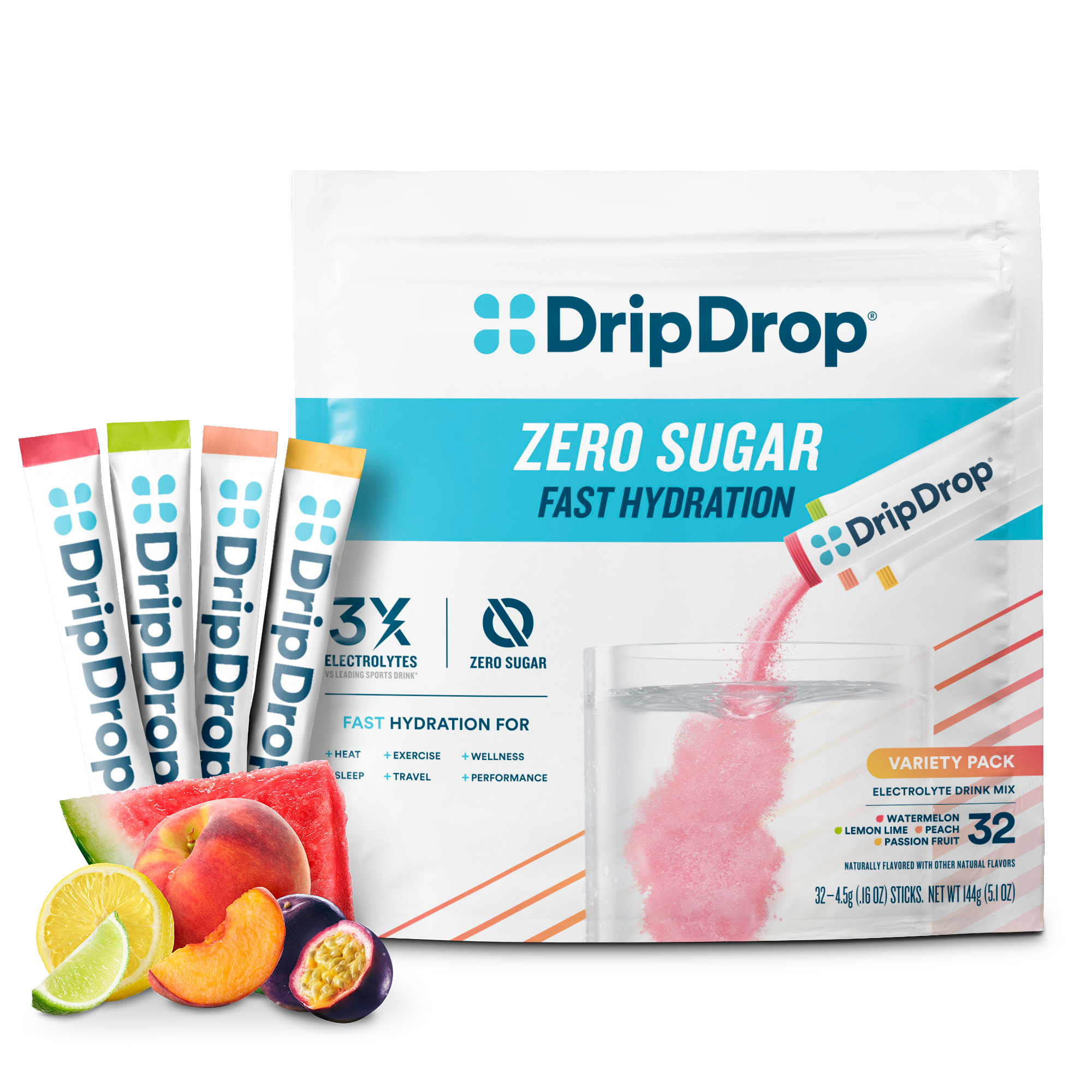Humans have an unquenchable thirst for water. It’s the most important nutrient for us on the planet, and ideally, we should be drinking water every day. For many, it’s a challenge to keep up with this near-constant need for water. Busy everyday activities like work, school, and travel can distract us from drinking water as often as our bodies need.
But what is dehydration? Dehydration occurs when your body loses more fluids and electrolytes than it takes in. Though it affects millions of people in the United States, dehydration is one of the most common preventable medical conditions in the world. Despite its prevalence, many people are unaware of its dangers.
DripDrop was designed for fast hydration. This doctor-developed formula uses the precise ratio of sodium to glucose to enable your body to absorb water and electrolytes faster than normal, bringing your hydration levels up to speed.
Here are six dehydration facts that may surprise—and encourage you to sip more often.
Key Facts to Understand Dehydration
1. 75% of Americans are Chronically Dehydrated
A survey of 3,003 Americans [i] found that 75% of participants likely had a net fluid loss, resulting in chronic dehydration. Although the survey found that Americans drank about eight servings of hydrating beverages per day, this intake is offset by drinking caffeinated beverages and alcohol and eating a diet high in sodium.
Avoiding or limiting the number of caffeinated and alcoholic beverages you consume on a daily basis can help your body maintain proper hydration levels. Eliminate excess sodium from your diet and replace these food ideas with hydrating fruits and veggies such as cucumber, lettuce, and pineapple.
2. Dehydration Causes Fatigue
A pair of recent studies [ii] found that healthy young men and women who were mildly dehydrated were much more likely to feel fatigued [iii] during moderate exercise and even when sedentary. Fatigue is a common sign of dehydration, and it’s said to be the No. 1 cause of midday fatigue. Hydrating throughout the day can help avoid that midday slump.
3. Thirst Means You’re Dehydrated
Dehydration triggers the body’s thirst response. So when you feel thirsty, dehydration is already setting in. In many experiments, just 1% to 2% dehydration has been shown to trigger thirst [iv]. This level of dehydration can happen quickly, especially following intense exercise or when battling viruses.
Water is vital to staying hydrating, but it won’t get you far without electrolytes to carry out essential bodily functions. Drinking an electrolyte mix like DripDrop throughout the day or before/after a workout will provide vital electrolytes and help your body absorb these vitamins and minerals fast.
4. Dehydration Causes Foggy Memory, Irritability, and More
Research shows that even mild dehydration puts stress on our cognitive functioning. In younger adults, for instance, dehydration was linked to a dip in concentration and short-term memory as well as an increase in feelings of anxiety and irritability. Studies with children are more conclusive that hydration can improve attention and memory. [v]
5. Hydration Can Boost Your Metabolism
Although the evidence is limited, your metabolism could benefit from drinking cold water. In fact, one study found that drinking cold water helped boost healthy men and women’s metabolic rate by 30%. [vi] The researchers concluded that the body expended more energy heating the cold water, which resulted in the boost in metabolism.
6. Dehydration Is One of the Most Common Risk Factors for Kidney Stones
A landmark 1990 study [vii] examined the causes of kidney stones in more than 700 patients. Chronic dehydration, caused by a variety of factors, was believed to be a contributing element in about 20% of cases. More recently, researchers have more deeply examined the link between dehydration and kidney stones. In one five-year randomized trial [viii], patients with kidney stones were told to drink more water, which resulted in a drop in kidney stone recurrence.
Combat Dehydration with DripDrop
Understanding what dehydration is, how it’s caused, and common symptoms can help you take proactive steps to stay hydrated all day long. These dehydration facts highlight how dehydration can impact many aspects of our well-being from causing feelings of fatigue to possible links to kidney stones.
DripDrop’s formula using oral rehydration solution science to tap into a hydration shortcut using the precise ratio of sodium to glucose. This helps your body absorb fluids and electrolytes more quickly and efficiently, hydrating your body faster than traditional sports drinks. DripDrop includes just half the sugar found in the leading sports drink and three times the electrolytes, supplying sodium, potassium, and magnesium to support overall health and rehydrate you quickly.
Don’t wait until you’re thirsty to reach for your DripDrop—remember these hydration facts and stay hydrated all day long.












